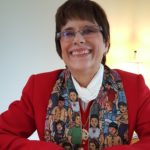Join in Widening the Circle of Concern
By Rev. Karen Lee Scrivo
I was familiar with the highlights of Widening the Circle of Concern, but it wasn’t until I joined some Unitarian Universalist ministers recently that I really delved into the UUA Commission on Institutional Change’s nearly 200-page report.
As you may know, the commission’s report analyzes structural and systemic racism and white supremacy culture within Unitarian Universalism and makes recommendations for long-term cultural shifts and institutional change aimed at redeeming “the essential promise and ideals of Unitarian Universalism.” (Link to the Report and Study Guide here)
One of the first chapters focuses on how our Unitarian Universalist theology calls us to do the work of collective liberation and “address equity, inclusion, and diversity issues.”
When I became a UU more than 35 years ago, theology wasn’t something we talked about much in my small fellowship. Like many, I came to Unitarian Universalism from other faith traditions with a long list of things I didn’t believe. I wasn’t as good about articulating and sharing with others what I did believe. Thankfully, that’s changed.
I appreciate Rev. Dr. Sofia Betancourt’s clarity about our theology in her 2018 GA lecture, excerpted in the report. Rev. Dr. Betancourt is an associate professor of UU Theologies and Ethics at Starr King School for the Ministry, where we met when I was a seminarian there.
Rev. Dr. Betancourt says, “our First Principle calls us to learn a language of resilience and liberation in response to the pain of this world we have inherited so that we might find wholeness and grace in our brokenness. A Universalist theology of liberation in the present-day centers our capacity to be sanctuaries of radical truth-telling and abundant compassion so that the all-encompassing love at the center of our tradition can serve to make all of us more whole.”
Our Universalist ancestors believed no one is outside God’s love and that we must create the Kingdom of God in this life. In today’s divided world, we’re called to work for justice, equity, and compassion in human relations and building a free and fair world for all. Our Unitarian ancestors encouraged us to find truth based on facts, reasoning, and investigation and the belief that we can discern our own truth and find meaning in our lives as well as sacred texts.
The report observes that over time individual exploration and experience overshadowed “the communal as the locus of theological exploration. One of the unintended consequences has been the atomized individualism of the search for truth and meaning without accountability to its impact in communities.”
In addition, the report observes how this has shaped our history.
“Because we have not updated our theology, the history of we know privileges the dominant culture and those voices that were preserved in our history and written record. We now have a chance to embrace a more inclusive and accurate history. We have theologians – and historians — among us whose work could give us a different frame.”
One of the recommendations in the Theology section calls us to acknowledge anti-oppression work as an essential UU theological mandate.
“We need to resurrect, research, document, and teach the words of Black people, Indigenous people, people of color, LGBTQ individuals, women, and others who have been largely lost through their presence has been with us throughout history.”
The report also calls on white Unitarian Universalists “to engage in deep spiritual discernment” and … examine the dominant white-centered culture of our congregations.” Paula Cole Jones explored this with UUSJ members in April and May as part of the facilitated conversation, dialogue, and discernment on Widening the Circle of Concern. She also discussed the 8th Principle, which she co-authored with Bruce Pollack-Johnson. The 8th Principle calls for congregations to “affirm and promote: journeying toward spiritual wholeness by working to build a diverse multicultural Beloved Community by our actions that accountably dismantle racism and other oppressions in ourselves and our institutions.”
“Author, scholar, and teacher Sharon Welch note that from an ethical perspective, we are called to liberate ourselves from bias, stating that a theology of liberation frees us from not seeing bias or privileged systems and allows us to see the threats of white violence,” the report observes.
Commission member Dr. Elías Ortega, president of Meadville Lombard Theological School, sees a way forward as we grapple with oppression, suffering, and the legacy of white supremacy in the world.
“We aspire to transform and be transformed by love and justice,” he said in a 2018 General Assembly presentation, excerpted in the report. “We must fashion ourselves into faithful people who draw wisdom from our inherited tradition. This is not an individual task but a collective practice.”
Rev. Leslie Takahashi, chair of the Commission on Institutional Change, talked about what UU congregations and organizations need to do to create more diverse, inclusive, and equitable communities in a March sermon at Cedar Lane Unitarian Universalist Church (link here Rev. Takahashi’s sermon begins at about 38:38.)
May we join in building this new way forward.
 Rev. Karen Lee Scrivo, a longtime UUSJ member, is a community minister affiliated with Paint Branch Unitarian Universalist Church in Adelphi, MD.
Rev. Karen Lee Scrivo, a longtime UUSJ member, is a community minister affiliated with Paint Branch Unitarian Universalist Church in Adelphi, MD.

